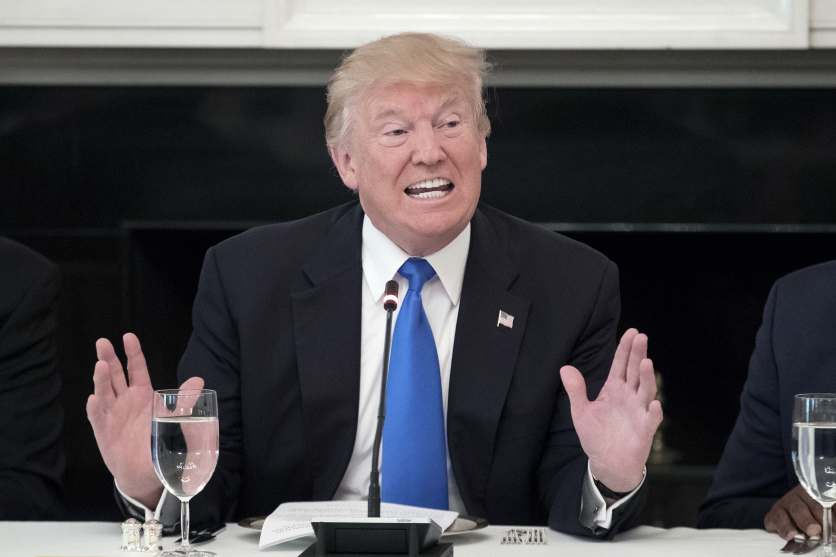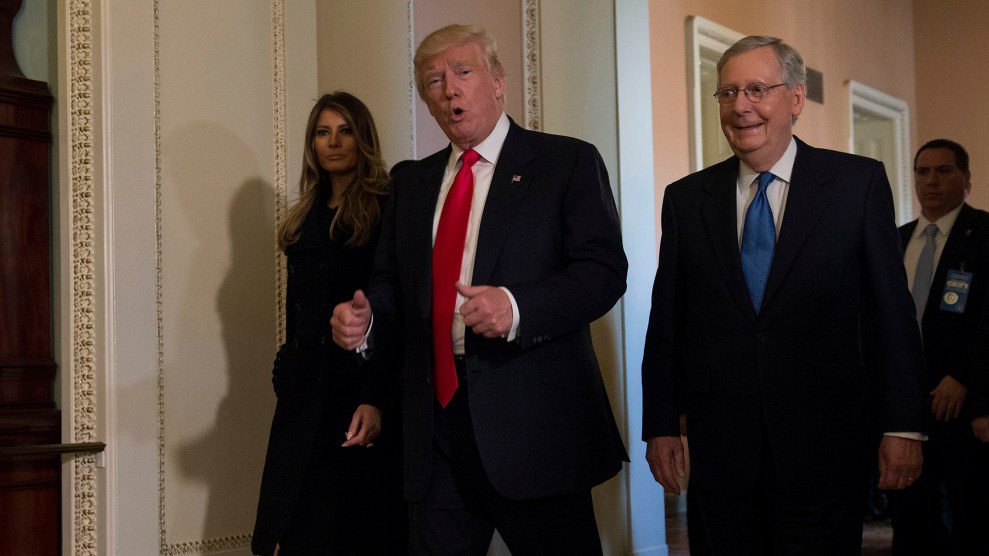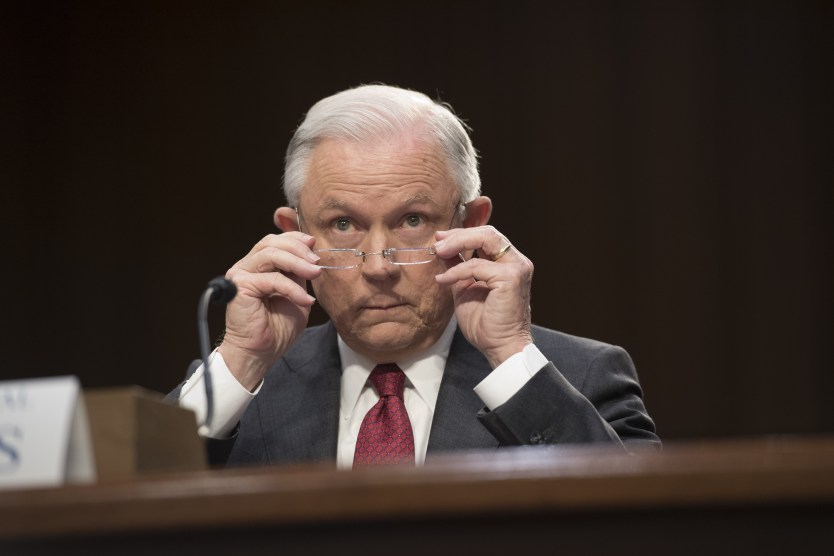This story originally appeared on The Guardian.
Business and the Economy
Given all that Donald Trump promised the business world during his bombastic campaign, it’s tempting to dismiss the president’s first six months with a “meh.” It would also be myopic.
While protesters are worried about the future, the president has so far failed to pass his tax reforms, which business wanted. But at the same time fears that his China rhetoric, threats of trade wars and tweets about penalties for US businesses who ship jobs overseas, have not amounted to much.
The economic trends started under Obama have continued: stock markets have continued their giddy ride to uncharted highs, unemployment has continued to drift down and interest rates have remained low.
Trump’s overture may seem a little weak, but the president has already made significant moves and still more may be happening in the wings.
Trump has ordered a review of Dodd-Frank, the regulations brought in to tame US financial institutions after they triggered the worst recession in living memory. He has appointed a sworn enemy of net neutrality over at the Federal Communications Commission, who is now working to dismantle Obama-era open internet protections. He has freed up energy firms to start polluting rivers again and scrapped a rule that barred companies from receiving federal contracts if they had a history of violating wage, labour or safety laws.
After years of gains for consumer, environmental and worker rights groups, the pendulum is being swung the other way—but most often those changes are happening behind closed doors.
In March, Trump pledged to “remove every job-killing regulation we can find” and deregulation teams have been set up to comb through the statutes looking for rules to cull. A recent ProPublica and New York Times investigation found Trump’s deregulation teams were being conducted in the dark in large part by appointees with deep industry ties and potential conflicts of interest.
It’s hardly surprising given that the Trump administration has literally removed the White House visitors book, so we may never know who has been whispering in the president’s ear. Six months in, it is hard to tell what is being cut and by whom. We may never know the consequences of Trump’s regulation death squads until it’s too late.
The Environment
In the past week, both Emmanuel Macron and Sir Richard Branson have claimed that Donald Trump has been gripped by regret over his decision to withdraw the US from the Paris climate agreement. But hopes that the US president will reverse this decision sit uneasily with the consistency of his administration’s environmental rollbacks.
In Scott Pruitt, Trump has an Environmental Protection Agency chief who understands how the agency works and how to hobble it. Pruitt, who has dismissed the mainstream scientific understanding of climate change, has spearheaded a concerted effort to excise or delay dozens of environmental rules.
Emissions standards for cars and trucks, the clean power plan, water pollution restrictions, a proposed ban on a pesticide linked to developmental problems in children, regulations that stop power plants dumping toxins such as mercury into their surrounds—all have been targeted with efficacious zeal by Pruitt.
The EPA administrator was also a fierce proponent of a US exit from the Paris accord, ensuring that Trump wasn’t swayed by doubts raised by Rex Tillerson, the secretary of state, and Ivanka Trump, his daughter and adviser. The US won’t be able to officially pull out until 2020, but the decision has dealt a hefty blow to the effort to slow dangerous global warming and provided a tangible victory for the nationalist, climate change denying elements that now roam the White House.
Elsewhere, public land has been thrown open to coal mining—an industry repeatedly fetishized by Trump—and oil and gas drilling is being ushered into America’s Arctic and Atlantic waters. Two dozen national monuments are under review, several may be shrunk or even eliminated.
In less than six months, Trump has begun to tear up almost all of the key planks of Barack Obama’s environmental agenda. This blitzkrieg is likely to slow now that it faces a thicket of legal action launched by enraged environmental groups and some states, such as New York. But to Trump’s supporters, the president, who pledged during the campaign to reduce the EPA to “tidbits”, is delivering on his crusade to transport the environmental and industrial outlook of the late 19th century to the modern day.
Immigration
Donald Trump’s bluster over his harsh immigration reform—namely the implementation of a diluted Muslim-targeted travel ban and a crackdown on undocumented immigrants—belies the cost these self-proclaimed victories have had on both the fundamental institutions of democracy and the most vulnerable communities in the United States.
Take the travel ban, which targets refugees and visa applicants from six Muslim majority countries. The president’s first failed order, haphazardly issued in January, provoked scenes of chaos at airports around the country—temporarily separating families, canceling legitimately issued visas and propelling the country toward a constitutional crisis, before a series of federal courts intervened to block it.
After his second attempt in March was blocked again in the lower courts, the president, seemingly without care for due process or respect for the co-equal branches of government, threatened to simply abolish the federal appeals court he incorrectly identified as responsible for the decision.
Trump’s bullish perseverance on the ban, which has left many in Muslim and refugee communities around the US living in fear, has resulted in a temporary ruling in the supreme court that allows a much diluted version of the order to come into effect. Although the president heralded the decision a victory, the ultimate test comes in autumn when the country’s highest court will ultimately rule on the ban’s constitutionality.
The president has also moved quickly to supercharge efforts to round up and deport undocumented immigrants. By empowering Immigration and Customs Enforcement (Ice), the federal agency responsible deportations, to target essentially anyone in the country without legal paperwork, the number of immigration arrests has soared. Although the administration has celebrated this uptick, it has actually been able to deport people at a much slower rate due to the crippling backlog inside America’s immigration courts.
Trump’s attempt at a solution to this has been to create a network of new courts, attached to remote detention centers and far from the reach of immigration attorneys. The strategy, plagued with due process concerns, has enjoyed mixed success. But, once again, it is those most vulnerable—many of whom have lived in America without paperwork for decades and have no criminal history—who have paid the highest price.
Diplomacy
First, the good news. Donald Trump has not started a war. He has therefore, so far, avoided the worst-case scenario that some predicted for his presidency. One-eighth of the way through his term, he does not yet have a stain on his record like George W. Bush has with Iraq. Instead his Twitter spats with cable TV hosts and their indulgence by the media are a luxury of peacetime.
But in other, important ways, the US president has set about diminishing America’s global leadership role and diplomatic standing. He has emphasized the defense of America and western civilization and downplayed democracy and human rights. He has warmed to authoritarian leaders in China, the Philippines, Russia and Saudi Arabia while going cold on Britain (still no visit), the European Union and Australia. His attacks on the press send an alarming message to dictators everywhere.
The world has noticed. A major survey of 37 countries by Pew Research last month found that just 22 percent of respondents had some or a great deal of confidence in Trump to do the right thing when it comes to international affairs. After his performance at Nato and G7 meetings, German Chancellor Angela Merkel said pointedly: “The times in which we could completely depend on others are, to a certain extent, over. I’ve experienced that in the last few days. We Europeans truly have to take our fate into our own hands.” At the G20, he cut a lonely, isolated figure.
The outlier in Trump’s foreign policy came on April 6, when the US launched 59 Tomahawk cruise missiles at an airfield in Syria in retaliation for the regime’s use of chemical weapons against civilians. It was a move welcomed by hawks and loathed by “anti-globalists” in Trump’s support base. But the most urgent issue, enough to test any US president, is North Korea. There is little evidence so far to suggest he will succeed where others have failed.This damage could be undone relatively quickly but the “America first” president’s proposed 30 percent cut to the state department, where many top staff have left and not been replaced, threatens to be a lasting legacy. Max Bergmann, a former official, wrote in Politico: “The deconstruction of the State Department is well underway…This is how diplomacy dies. Not with a bang, but with a whimper. With empty offices on a midweek afternoon.”
Gender and Equality
Trump’s White House has wasted little time erasing many of the changes that advocates for trans rights, reproductive rights and survivors of sexual assault achieved under the Obama administration.
The Trump team is in the middle of sharply reversing how the federal government enforces laws against gender bias. In February, the administration withdrew the Obama-era guidelines requiring schools to give transgender students unfettered access to bathrooms and locker rooms matching their gender identity. And Betsy DeVos, the education secretary, may restrict the federal government’s ability to intervene when colleges and universities do a questionable job of handling students’ complaints of sexual assault.
Trump is also attempting to dismantle the nation’s public safety net for family planning, with an assist from his party in Congress. The president has signed legislation encouraging states to withhold federal family planning dollars from Planned Parenthood. The latest version of Republican’s attempt to repeal the Affordable Care Act would eliminate the birth control mandate—which is also under fire from Trump’s health department—not to mention maternity coverage requirements.
Every repeal attempt has contained a measure to block women on Medicaid from using their insurance at Planned Parenthood—measures that would shutter scores of Planned Parenthood clinics across the country. And the administration is poised to give the green light to states, like Texas, that axe Planned Parenthood from their Medicaid programs.
The White House also has aims to zero out funding for the government-funded Legal Services Corporation, which is the main source of legal assistance for women attempting to escape domestic violence, when Congress passes a budget this fall.
Finally, there’s US supreme court justice Neil Gorsuch, Trump’s pick to replace the late Antonin Scalia, who observers say “has all the makings of an extreme anti-abortion justice.” Trump named Gorsuch eleven days into his presidency, fulfilling a longtime campaign promise to nominate justices who will vote to overturn Roe v Wade.
Criminal Justice
So far, efforts on criminal justice have been much more sizzle than steak, but the prospect of dramatic policy change looms just around the corner. Stuffed in a suite of executive orders signed in February, Trump commissioned a task force to make recommendations on combating “the menace of rising crime,” which has been an enduring theme of the administration despite being debunked by experts. That task force, which reportedly, and curiously, does not include police chiefs or criminologists is scheduled to make its recommendations on July 27.
“If you’re going to see anything from the Trump administration proposing new [or longer] mandatory minimums and a general return to the tough on crime tactics, I think you’ll see those recommendations made by the task force,” said Ames Grawert, a criminal justice researcher with the Brennan Center for Justice.
It remains unclear how much support there might be in Congress for taking up such recommendations. As recently as December there was real momentum behind a bipartisan bill to make sentencing less punitive, not more.
In the interim, attorney general Jeff Sessions has instructed federal prosecutors to seek the highest possible penalty in every case, and has championed initiatives to push state cases for federal prosecutors to obtain harsher sentencing.
In another reversal from the Obama era, Sessions has also signaled that the DoJ will not use its authority to investigate or reform local police departments, even in cases where gross negligence, or rampant civil rights violations may be occurring. Sessions tried, and failed, to pause a consent decree negotiated in Baltimore after the Freddie Gray unrest, and his department has so far flaked-out of a similar effort that was slated for Chicago under the previous administration.
“We will not sign consent decrees for political expediency that will cost more lives by handcuffing the police instead of the criminals,” Sessions wrote in an April 18 op-ed in USA Today.
Dominic Rushe, Oliver Milman, Oliver Laughland, David Smith, Molly Redden and Jamiles Lartey contributed to this report.












